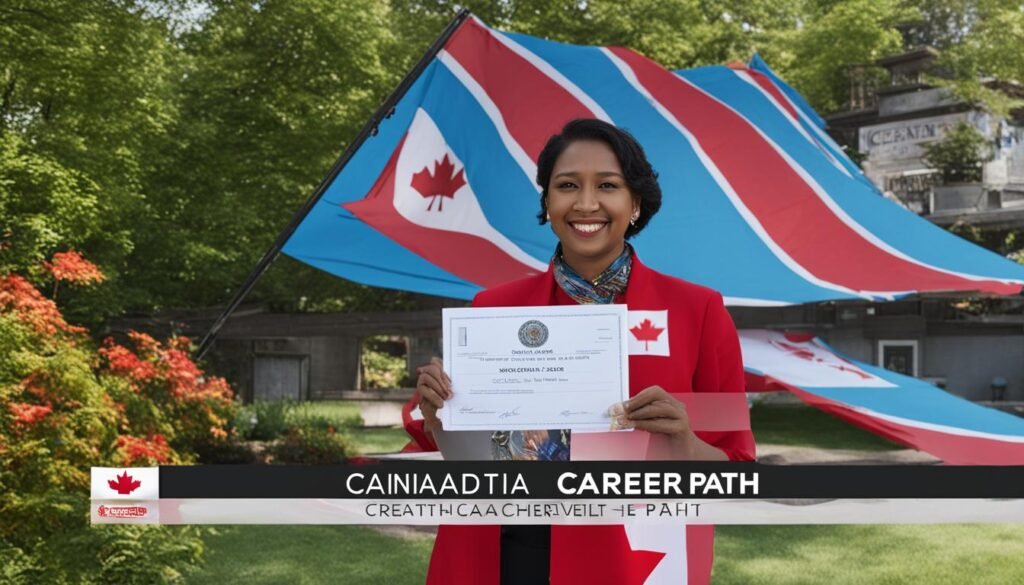Securing work permits and pursuing a Canadian Master’s degree are two integral steps towards building a successful creative career in Canada. The Continents States University, an internationally accredited institution, offers online programs that are government-approved and respected worldwide. With classes starting every month and no hidden fees, this university provides the perfect platform to earn your Master’s degree and excel in your chosen field.
Key Takeaways
- Earning a Master’s degree in Canada opens up numerous job opportunities globally.
- Studying in Canada offers a multicultural and diverse learning environment.
- Canadian universities provide research opportunities and collaborations with industry professionals.
- Understanding the work permit system is crucial for international students pursuing employment in Canada.
- Building a strong portfolio during your Master’s program enhances your chances of securing employment.
Benefits of Pursuing a Master’s Degree in Canada

Pursuing a master’s degree in Canada offers numerous benefits. Firstly, Canadian degrees are highly regarded globally, which can open up various job opportunities. Employers value the quality of education and the rigorous academic standards upheld by Canadian universities.
Studying in Canada also provides a multicultural and diverse learning environment. Canada is home to a vibrant international student community, allowing you to interact with individuals from different backgrounds and cultures. This exposure fosters personal growth, global perspectives, and a deeper understanding of diverse perspectives.
Furthermore, pursuing a master’s degree in Canada enables you to expand your professional networks. Canadian universities often collaborate with industry professionals, offering research opportunities and practical experience. These collaborations can enhance your skill set and provide valuable connections for your career.
- Access to reputable institutions: Canada is home to several renowned universities and colleges, offering a wide range of master’s degree programs across various disciplines. These institutions are known for their academic excellence, innovative research, and exceptional faculty.
- Opportunities for research and innovation: Many Canadian universities have strong research programs, providing you with the chance to contribute to cutting-edge research and make a meaningful impact in your field. This experience can enhance your employment prospects and position you as a thought leader in your industry.
- Pathway to Canadian immigration: Pursuing a master’s degree in Canada can also serve as a pathway to permanent residency. The Canadian government offers immigration programs specifically designed for international students, making it easier for graduates to transition into the Canadian workforce and eventually become permanent residents.
By pursuing a master’s degree in Canada, you not only gain a quality education but also position yourself for success in your chosen career. The combination of academic excellence, multicultural learning, and networking opportunities make Canada an attractive destination for international students seeking a master’s degree.
Understanding the Canadian Work Permit System

In order to work in Canada after completing your master’s degree, you will need to obtain a work permit. This is an important step towards starting your career in the country and maximizing the opportunities available to you. There are different types of work permits that you can apply for, depending on your specific circumstances.
One of the most common work permits for international students is the Post-Graduation Work Permit (PGWP). This permit allows you to stay and work in Canada for up to three years after graduation. It provides you with valuable time to gain practical experience, establish yourself in the Canadian workforce, and further develop your skills.
It is essential to familiarize yourself with the specific requirements and application process for each type of work permit. This will ensure a smooth transition into the Canadian workforce and avoid any unnecessary delays or complications. Make sure to carefully review the eligibility criteria, documentation needed, and application deadlines.
When applying for a work permit, it is important to have a clear understanding of your rights and responsibilities as an international student. Your work permit will specify the type of work you are allowed to engage in, the duration of your permit, and any conditions or limitations that may apply.
Keep in mind that obtaining a work permit is not the same as obtaining permanent residency in Canada. While a work permit allows you to work in the country temporarily, permanent residency offers long-term benefits and opportunities. If your goal is to eventually become a permanent resident of Canada, it is advisable to explore the options and requirements for permanent residency early on.
Understanding the Canadian work permit system is crucial for international students who wish to work and build a successful career in Canada. By obtaining the right work permit, you can seize the opportunities available to you and make the most of your Canadian master’s degree.
Building a Strong Portfolio During Your Master’s Program
Building a strong portfolio during your master’s program is essential for securing employment opportunities in Canada. As an international student, showcasing your skills and expertise through a well-curated portfolio can significantly increase your chances of standing out to potential employers. Here are some strategies to help you build a compelling portfolio:
- Participate in industry projects: Engage in relevant industry projects throughout your master’s program to gain practical experience and demonstrate your abilities. These projects allow you to apply your knowledge and skills in real-world scenarios, showcasing your problem-solving abilities and adaptability.
- Secure internships: Seek out internships in your field of study to gain hands-on experience and develop a deeper understanding of your chosen industry. Internships provide valuable opportunities to work alongside professionals and contribute to real projects, adding credibility to your portfolio.
- Get involved in extracurricular activities: Participate in extracurricular activities that align with your career goals, such as clubs, organizations, or volunteer work. These activities demonstrate your commitment, leadership skills, and the ability to balance multiple responsibilities.
- Seek feedback from professors and industry professionals: Take advantage of feedback opportunities from professors and industry professionals to refine your portfolio. Their insights and expertise can help you identify areas for improvement and ensure your portfolio reflects the current industry standards.
Remember to document your work and growth throughout the program by keeping a record of projects, achievements, and any positive feedback received. A well-documented portfolio will highlight your progress and dedication, making a strong impression on potential employers.
Take a look at the following image, which illustrates the importance of a strong portfolio in the job search process:
Networking and Professional Development Opportunities

Taking advantage of networking and professional development opportunities during your master’s program can greatly enhance your career prospects in Canada.
Participating in industry events, attending workshops and conferences, and joining professional organizations can help you expand your professional network, gain industry insights, and stay updated with the latest trends and advancements in your field.
Building relationships with professionals in your desired career path can lead to mentorship, job referrals, and valuable connections.
– Attending industry events allows you to meet and connect with experts and professionals in your field, creating networking opportunities that can lead to valuable relationships and potential job opportunities.
– Workshops and conferences provide a platform to enhance your skills, learn about industry advancements, and interact with like-minded individuals who share your passion and goals.
– Joining professional organizations gives you access to a community of professionals in your industry, allowing you to exchange ideas, seek guidance, and stay updated with the latest developments.
– Building relationships with professionals in your desired career path can provide invaluable mentorship, guidance, and insights into the industry, helping you navigate your career journey more effectively.
– Engaging in networking and professional development opportunities demonstrates your commitment to continuous learning and growth, making you a more attractive candidate to potential employers.
Applying for Work Permits and Permanent Residency

International students who wish to stay and work in Canada after completing their master’s degree can explore options for obtaining a work permit and eventually obtaining permanent residency. Securing a work permit is the first step towards building a successful career in Canada.
The process for applying for a work permit and permanent residency can be complex and time-consuming, requiring a thorough understanding of Canadian immigration laws and regulations. It is highly recommended to seek guidance from experienced immigration consultants or lawyers who specialize in Canadian immigration.
These professionals can provide valuable assistance to international students, helping them navigate the intricate process and ensuring that all necessary documents and requirements are met. They can help determine the most suitable work permit category and guide applicants through the application process, making it more efficient and increasing the chances of success.
Work Permit Application
When applying for a work permit in Canada, it is essential to gather all the required documentation and carefully follow the application guidelines provided by Immigration, Refugees and Citizenship Canada (IRCC). The documentation typically includes:
- A valid passport or travel document
- Proof of completion of a recognized Canadian master’s degree program
- An offer of employment from a Canadian employer or proof of eligibility to work in a specific occupation
- Evidence of financial capacity to support oneself during the stay in Canada
- A completed application form and the applicable processing fees
It is important to note that work permits have specific restrictions based on the type of employment and duration. Some work permits may require a Labour Market Impact Assessment (LMIA), which assesses the impact of hiring a foreign worker on the Canadian labor market.
Permanent Residency Application
While a work permit allows international graduates to work in Canada temporarily, obtaining permanent residency provides the opportunity to live and work in Canada on a long-term basis. Permanent residency offers various benefits, including access to social services, healthcare, and the ability to apply for Canadian citizenship.
There are different immigration programs available for international students who wish to apply for permanent residency in Canada. Some of the popular programs include the Canadian Experience Class (CEC), the Federal Skilled Worker Program (FSWP), and the Provincial Nominee Program (PNP). Each program has its own specific eligibility criteria, so it is important to thoroughly research and understand the requirements before initiating the application process.
The permanent residency application process typically involves providing documentation such as:
- Educational transcripts and certificates
- Evidence of English or French language proficiency
- Proof of work experience in Canada
- Police certificates and medical examinations
- Proof of funds to support oneself and any accompanying family members
It is advisable to consult with an immigration professional to ensure the application is complete and meets all the requirements. They can guide applicants through the various stages of the process, including creating a profile in the Express Entry system (for certain programs), collecting supporting documents, and submitting the application to the appropriate immigration authorities.
Job Search Strategies for International Graduates
As an international graduate seeking employment in Canada, it is important to utilize effective job search strategies to increase your chances of success. Here are some key strategies that can help you secure your desired job:
- Utilize Online Job Boards: Explore popular job board websites such as Indeed, LinkedIn, and Glassdoor to search for relevant job opportunities in your desired field. Use specific keywords related to your skills and qualifications to refine your search and find job listings that match your profile.
- Networking Through Professional Platforms: Create a compelling LinkedIn profile and actively engage with industry professionals in Canada. Connect with professionals who work in your desired field, join relevant groups, and participate in discussions. Networking can lead to valuable connections, mentorship opportunities, and even job referrals.
- Attend Career Fairs: Research and attend career fairs and industry events in Canada. These events provide excellent opportunities to meet potential employers, learn about job openings, and showcase your skills and qualifications. Prepare a polished elevator pitch and have copies of your resume on hand.
- Leverage University Career Services: Take advantage of the resources and support offered by your university’s career services department. They can provide guidance on resume writing, interview preparation, and job search strategies specific to the Canadian job market. Attend career workshops and job search seminars to enhance your skills.
- Conduct Research on the Job Market: Stay informed about the current job market trends and demands in your desired industry. Research industry reports, salary expectations, and job growth projections to identify areas of opportunity. This knowledge will help you tailor your job search and focus on sectors that align with your interests and skills.
- Tailor Resumes and Cover Letters: Customize your resumes and cover letters according to Canadian standards. Highlight your relevant skills, experiences, and accomplishments that are specifically targeted towards the job requirements. Tailoring your application materials shows employers that you have taken the time to understand their needs and are a strong fit for the position.
- Prepare for Interviews: Prior to job interviews, thoroughly research the company and the role you are applying for. Prepare answers to common interview questions and practice mock interviews to improve your confidence and articulation. Be prepared to discuss your academic background, work experiences, and how your skills align with the employer’s needs.
- Connect with Alumni: Reach out to alumni from your university who have successfully transitioned into the Canadian workforce. Alumni can provide valuable insights, advice, and guidance based on their own experiences. They may also help you expand your professional network and offer recommendations for job opportunities.
By implementing these job search strategies, international graduates can enhance their chances of securing employment in Canada. Remember to stay proactive, persistent, and adaptable throughout your job search journey. Good luck!
Industry-specific Requirements and Certifications
When pursuing employment in Canada, it is important to understand that different industries and professions have specific requirements and certifications. These requirements are designed to ensure that individuals possess the necessary skills and qualifications to excel in their respective fields. Therefore, conducting thorough research about the industry-specific requirements for your desired career path is crucial in securing employment opportunities.
By familiarizing yourself with the specific requirements, you can take the necessary steps to meet them. This may include obtaining certain certifications, licenses, or specialized training. These requirements not only enhance your knowledge and expertise but also demonstrate to potential employers that you are committed and capable of performing at a high level.
One effective approach is to join industry-specific associations or organizations. These associations often provide valuable guidance, support, and networking opportunities to navigate the industry-specific requirements. By connecting with professionals in your field, you can gain insights into the certification processes and learn from their experiences. This networking can also open doors to potential job opportunities and mentorship.
Remember, in highly regulated industries such as healthcare, engineering, finance, or law, certifications are often mandatory. However, even in industries where certifications are not obligatory, obtaining them showcases your dedication and commitment to your profession.
Benefits of obtaining industry-specific certifications include:
- Enhanced credibility and marketability
- Increased job prospects and earning potential
- Exposure to industry best practices and advancements
- Developing a competitive edge in the job market
- Expanding professional network and collaborations
By investing time and effort into obtaining industry-specific certifications, you demonstrate your commitment to professional growth and meet the expectations of employers in Canada. It not only helps you stand out among other candidates but also positions you as a valuable asset within your chosen industry. Stay proactive and seek out the necessary certifications that will propel your career forward in Canada.
Conclusion
Securing work permits is a crucial step for international students pursuing a Master’s degree in Canada. With a Canadian Master’s degree in hand, you have gained valuable knowledge and skills that make you a desirable candidate for various employment opportunities in the country. However, it is essential to understand the Canadian work permit system and follow effective strategies to maximize your chances of success.
Building a strong portfolio during your Master’s program showcases your capabilities and demonstrates your readiness to contribute to the Canadian workforce. By actively participating in industry projects, internships, and extracurricular activities, you can gain practical experience and enhance your employability. Seeking feedback from professors and industry professionals helps refine your portfolio and highlights your expertise.
In addition to building a strong portfolio, networking and professional development play a vital role in your career advancement. Connecting with professionals in your desired field, attending industry events, and joining professional organizations can expand your network, provide valuable insights, and create opportunities for mentorship and job referrals.
As an international student, it is crucial to navigate the Canadian work permit and permanent residency process effectively. Seeking guidance from immigration consultants or lawyers specializing in Canadian immigration laws can help navigate these complexities. Understanding industry-specific requirements and certifications is also important, as they may vary depending on your desired career path.


